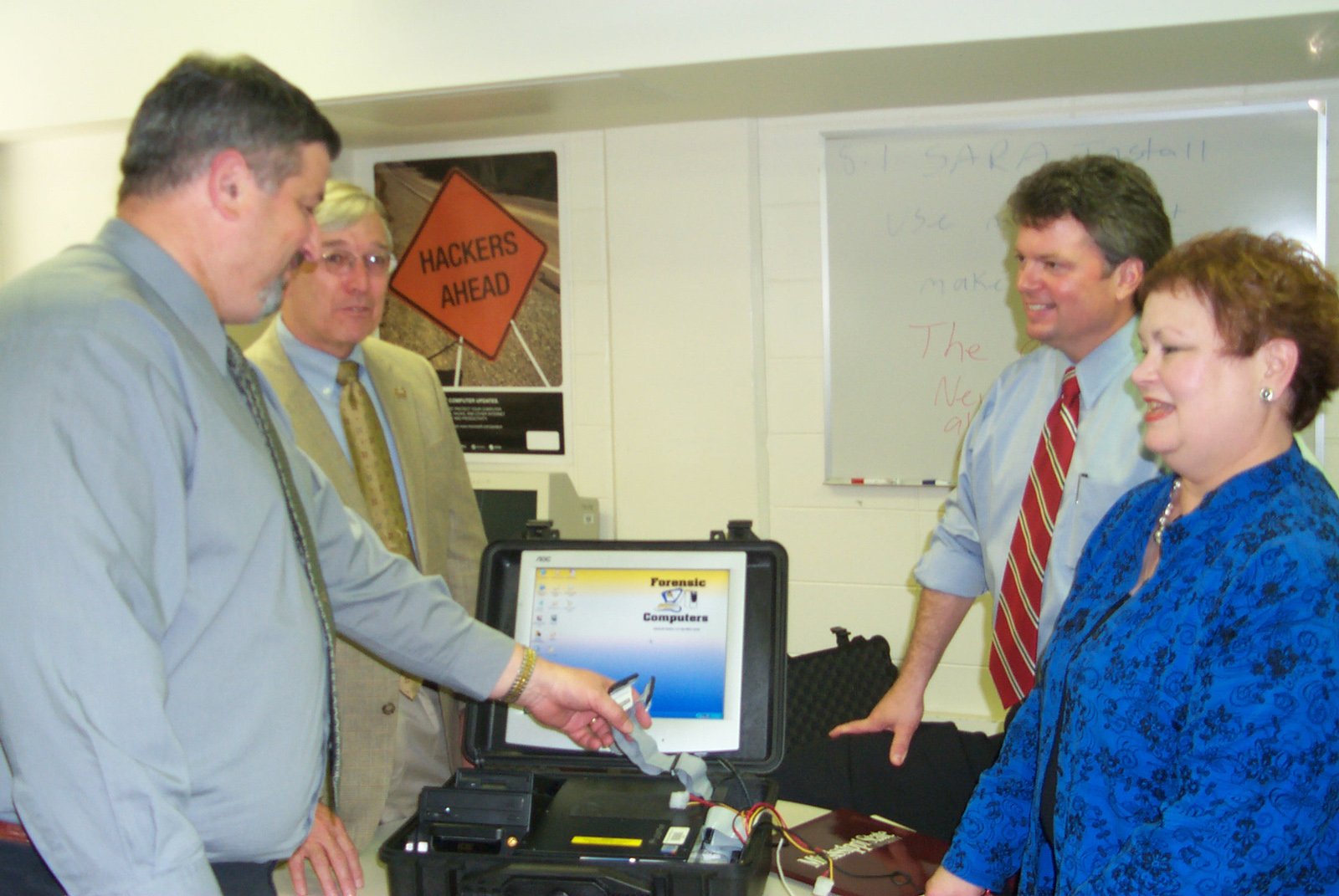Contact: Phil Hearn

STARKVILLE, Miss.--Mississippi State computer security expert Ray Vaughn's dream of establishing a Jackson law enforcement training center devoted to fighting such Internet-related crimes as pornography and identity theft soon will be a reality.
The university's Center for Computer Security is joining forces with the state Attorney General's Office, FBI and Jackson State University to create a cyber crime lab that bridges classroom instruction on the Starkville campus with on-the-job training in Jackson.
"We want to set up a computer security training center in Jackson," said Attorney General Jim Hood. "State and local law enforcement officers will get classroom training at Mississippi State, then come to Jackson for the hands-on work."
While the AG's office has only one computer forensics examiner and three cyber crime investigators, most state and local law enforcement officials have no background in the special investigative techniques needed to solve cyber crimes, university experts point out.
Ray Vaughn, a computer science and engineering professor who heads the MSU center, said anticipated approval of a $986,643 U.S. Justice Department grant is paving the way for the Jackson crime lab at JSU's E Center on Raymond Road, a former Allstate Insurance building that now houses state homeland security offices. Loretta A. Moore, chair of JSU's computer science department, coordinates her school's effort.
"The intensive classroom training at MSU will provide officers with the basics of conducting forensics investigations of such computer crimes as child pornography and identity theft," said Vaughn. "We'll teach such courses as introduction to computers and computer forensics software, as well as proper search-and-seizure procedures."
Addressing the state's shortage of trained computer forensics investigators, particularly at local levels of law enforcement, is a priority of Vaughn's program. A department colleague, Dave Dampier, teaches students how to collect online evidence, dissect and analyze storage disks, keep detailed logs, protect the "chain of custody," and present expert testimony in court.
"The hands-on training will come in Jackson when officers work on real cases in a real environment, sitting shoulder-to-shoulder with computer forensics investigators in a computer crime lab and applying what they've learned in the classroom," said Vaughn, a Hattiesburg native and retired Army colonel who once directed Pentagon computer systems.
Vaughn and Dampier, who created and teaches a popular MSU computer forensics course, conceived the idea for the federal/state/university collaboration. With the help of Sen. Thad Cochran, R-Miss., they were successful in pushing for funding through the DOJ's Bureau of Justice Assistance.
Vaughn said the purpose of the collaboration is to unify the limited computer crime investigation expertise within the state, consolidate and share current tools and processes, and create a capability for training state and local law officers in modern techniques necessary for combating the growing incidence of computer-based crime.
"We have a task force in operation that includes personnel from my office and the FBI," said Hood, noting staff from both agencies will be assigned to the Jackson center, along with instructors from JSU and MSU. "We want to put everybody under one roof.
"Where we've been lacking is in our ability to train local law enforcement officers so they can bag and tag--go in, seize a computer, secure evidence of crimes, and preserve it for use in court," the state's chief legal officer added.
MSU President Charles Lee said, "This cooperative state-federal-MSU-JSU venture is another example of the power of such partnerships to apply university resources and expertise to improving the quality of life for our state's citizens. We're pleased to lead an effort that will enhance personal and national security."
MSU is one of only 56 institutions nationwide designated by the Department of Homeland Security and the National Security Agency as a National Center of Academic Excellence in Information Assurance Education. The university has the only such center in a region that includes Mississippi, Arkansas, Louisiana, Kentucky, and Tennessee.
The DOJ grant proposal is for 18 months of activity needed to create the Jackson center and begin operations with law enforcement officials, Vaughn said, noting future funding proposals would be submitted to sustain the initiative. The FBI will support its involvement with appropriate separate funding.
NEWS EDITORS/DIRECTORS: For more information, contact: Dr. Ray Vaughn at (662) 325-7450 or vaughn@cse.msstate.edu; or Dr. Dampier at 325-8923 or dampier@cse.msstate.edu.
In Jackson, Dr. Moore may be reached at (601) 979-2105 or loretta.a.moore@jsums.edu; or special assistant AG Jean Smith Vaughan at (601) 359-3817 or jvaug@ago.state.ms.us.